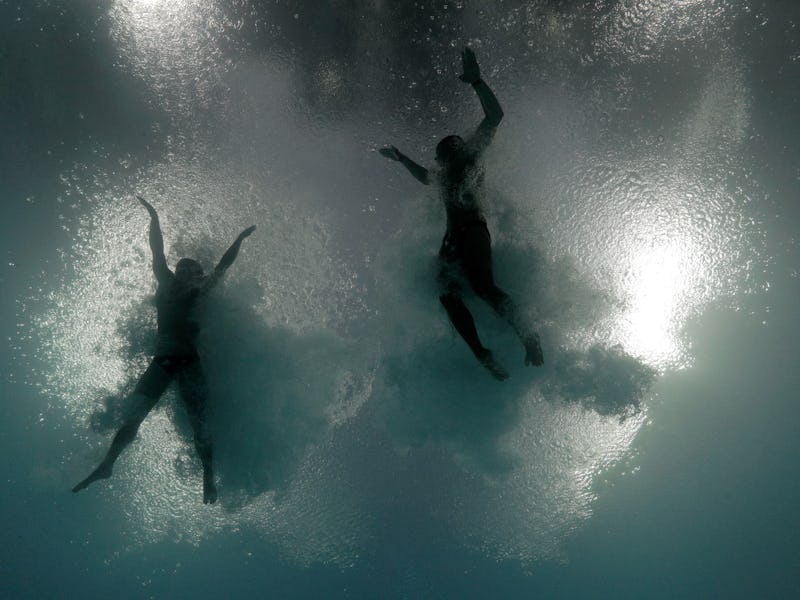Homonationalism Is Why We Talk About Gay Olympians That Way
Sometimes the person waving the rainbow flag is just trying to distract you.

In a straight man’s world — let’s face it, we live in one — a man’s athleticism is often seen as an outgrowth of the lust towards women that defines his sexuality. The multisyllabic explanation of this goes thusly: Neo-liberalism attempts and fails to conceal a dogmatic belief in heteronormative power structures beneath bromidic tribute to gender diversity. In other words, NBC’s Olympic announcers don’t know what to do when the gays win. This leads to a sort of rhetorical panic and verbal judo that repackages the individual successes of LGBT athletes as rewards for voters and societies willing to tolerate dudes liking dudes and ladies liking ladies. Credit gets transferred from the athlete to traditional power structures, from Megan Rapinoe to the country that wouldn’t let her get married only a few years ago. This phenomenon is called homonationalism and it’s why the Olympics can be a bit of a mindfuck for non-straights.
Homonationalism has a poster child and that man is British diver Tom Daley, an openly gay athlete who just won the Bronze metal in synchronized diving with teammate Daniel Goodfellow. Daley is famous like Johnny Weir is famous, but he doesn’t wear elaborate outfits or court that kind of attention. He mostly just dives — very well — while accidentally standing in for the idea that individual liberty is really great when you’re afforded it by the decisions of hetero power brokers in Parliament and on Downing Street.
This year, his sexuality has been referred to fewer times because the games aren’t being held in China, but he has been referred to, rather enigmatically, as a pioneer.
In her book Terrorist Assemblages: Homonationalism in Queer Times, queer theorist Jasbir Puar introduces the idea of homonationalism and explains how it has shifted the portrayal of queer people in the media. Whereas the AIDS crisis in the 80’s and 90’s portrayed the queer community as a symbol of death, the more recent incorporation of a queer agenda into mainstream politics and media has spurred on more positive associations. The fight for gay marriage is a great example. It was successful in the United States and also kinda fun and very palatable. The problem is that this sort of agenda is palatable because it is so in sync with the heteronormative one. Everyone wants to get married right? Gay people and straight people are totally the same! This is a subtly oppressive idea.
Britain’s embrace of its medal-winning gay diver may project progressiveness, but remove Daley’s sexuality from the equation and he’s just another really good-looking cisgender white guy. Sure, he sleeps with boys, but it’s easy to block that out in order to feel comforted by his athletic, male whiteness. Using the least offensive parts of the queer movement to bolster a collective attitude of progressiveness excludes the members of the queer community who need visibility the most. Daley may symbolize evolving social beliefs about homosexuality, but he also looks like the twink who would ignore you at a Fire Island Pines party. The gay male community already has a serious problem with excluding more marginalized members of the queer community, and Daley’s fame does not help to dismantle that privilege.
The more insidious part of homonationalism is the injustice a country can get away with while celebrating its devotion to social justice. An open, national discourse about gay people and the unabashed support of an openly gay athlete makes Britain appear open-minded so it can make its continued oppression of marginalized people less blatant. The ongoing refugee crisis in Britain, for example, has invited plenty of homonationalism, or “pinkwashing” as some call it, with Britain’s far right waving around a half-assed gay agenda to distract from all that less telegenic islamophobia. Not too long ago, the Member of European Parliament for Britain’s UK Independence Party (UKIP) David Coburn said, “I don’t know about you, but I am a homosexual and I do not want to be stoned to death,” leaning on an LGBT issue to justify his bigoted beliefs. In the end, playing the LGBT card to promote an authoritarian, nationalistic point of view isn’t an act of inclusivity.
Daley and Goodfellow preparing to dive at the 2016 Rio Olympics
The majority of people living in liberal democracies don’t actively pay attention to and parse LGBT issues, which is both understandable and why pinkwashing works so well. Distracting from a nation’s systemic oppression of people defined by their otherness while dangling an agreeable social issue in front of the public’s face is terribly effective and will likely continue to be. For those who have dedicated time to learning about the LGBT community’s struggle, however, one of the most frustrating aspects of homonationalism is the assumption that gay people are going to be fooled by it — or worse. There is the implication that if gay people are treated well, they’ll be fine when others aren’t.
But not all gay people look like Tom Daley. Some of them look a lot like Muslim immigrants and others simply don’t fit in comfortable visual silos.
Homonationalism may come from a place of confusion or even kindness, but it remains an insult to social progress. When we hold up our gay athletes as proof of our openness to others while not actually being open to others, we coop their achievements and diminish them. By all means, root for Tom Daley. He’s engaged to Dustin Lance Black, who wrote Milk, which was a good movie. And Daley himself seems like a good guy. Just remember that goodness doesn’t transfer. Britain has its own problems.